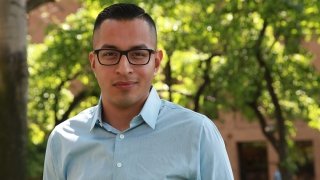Omar Ivan Hernandez was only one when he left his native Mexico with his mother and brother in 1993 and entered the United States illegally. He grew up in Garden Grove and graduated from Santiago High School in 2009. He is now back at his alma mater as a member of the Southern California College Advising Corps (SCCAC), a program run by USC Rossier’s Center for Enrollment Research, Policy, and Practice (CERPP).
He sees himself in many of the students he is advising, especially in light of the uncertainty emerging in the new national administration.
The day after the election in November, students filled his office, spewing tears and anxious questions about the new president’s vows to crack down on illegal immigration.
“They were asking me, ‘What’s going to happen to my parents? What’s going to happen to me? Should I apply to college anymore?’” Hernandez recalls.
At one point, Hernandez went to his car, shut the door and gave in to his own raw emotions. “I cried for 30 minutes,” he says. “Then I regrouped and went back to work. My students were asking me questions they weren’t asking their teachers. Having been in their shoes, I was able to bring them some comfort.”
Eight years ago, Hernandez enrolled at Cal State Fullerton after graduating high school but dropped out after a year because he could not afford to pay for tuition and books despite working several jobs. Financial aid was not an option because of his undocumented status, so he continued his education at a community college, unsure if he would ever have the resources to return for a four-year degree.
Then, in 2012, President Obama’s Deferred Action for Childhood Arrivals (DACA) program allowed Hernandez to apply for financial aid, which enabled him to resume his studies at Cal State Fullerton. In 2015 he earned a bachelor’s degree in human services and became the first member of his family to graduate from college.
After graduating, he joined SCCAC, launched in 2013 by CERPP in partnership with the national nonprofit College Advising Corps. The program places recent college graduates in 23 high schools to serve as full-time college counselors for two years, with the goal of improving college outcomes for first-generation, low-income and other disadvantaged students.
By coincidence, Hernandez was assigned to his former school, where he oversees college planning for 470 seniors. A few dozen students are undocumented.
When they have voiced their fears that applying for college or financial aid will expose them to immigration authorities, Hernandez thinks about his hard-working parents, particularly his father, who installs flooring for a living. His father’s work is literally backbreaking: The long hours bending over have led to two surgeries and several metal screws that hold his spine together.
“He always told me, ‘Go to school, work your brain. Don’t work your back like I do. Get your education.’ That stuck with me. So I tell my kids: ‘Quit does not exist. Push forward, keep working, get your education. No one will ever take that away. That diploma will always be there.’”




